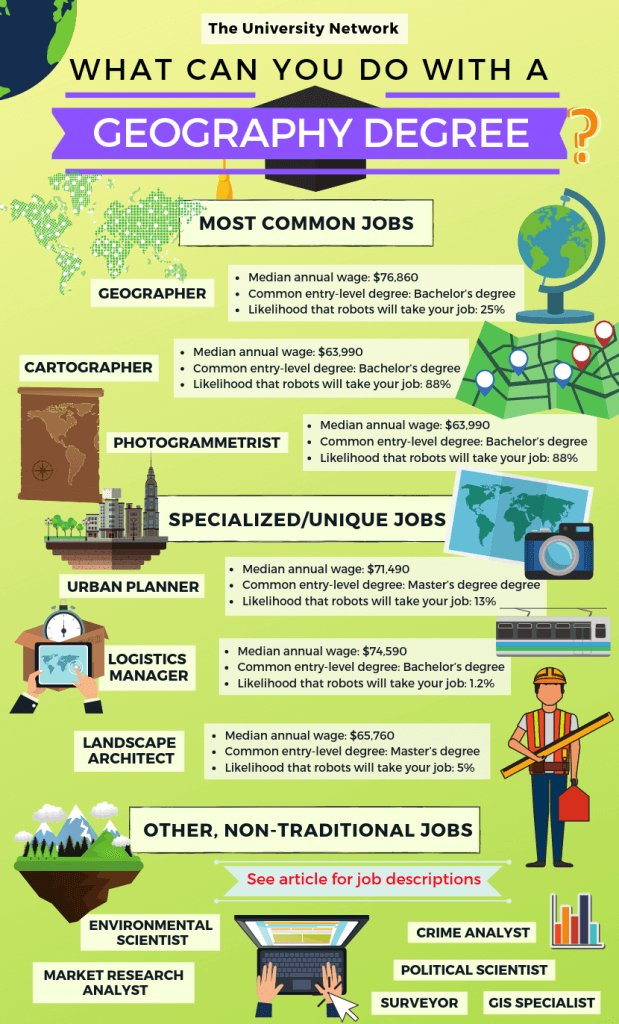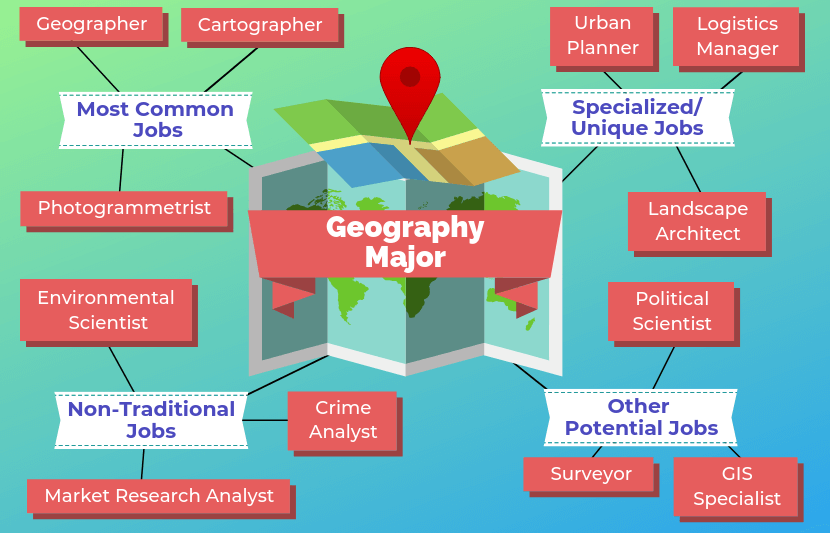Geographers are students of the natural environment and human population of the Earth. They work in some capacity across many fields analyzing political and natural boundaries. As cartographers, photogrammers, and GIS specialists, they make maps that may provide information about everything from traffic patterns to tree density to crime rates. Others work as land surveyors, detailing property boundaries, or as landscape architects, crafting designs of outdoor areas.
Here is a list of 12 jobs for geography majors:
Most Common Jobs for Geography Majors
1. Geographer
Geographers are social scientists who gather and analyze data about the Earth and its human and animal inhabitants. They use technologies such as geographic information systems (GIS), remote sensing, global positioning systems (GPS), and other tools to perform data mining and gather and organize information. Geographers may work for a variety of different types of organizations, but most commonly are employed by the government and various kinds of architectural or civil engineering companies. Entry-level geographer jobs are often open to candidates with bachelor’s degrees.
Median annual wage: $76,860
Common entry-level degree: Bachelor’s degree
Likelihood that robots will take your job: 25%
2. Cartographer
Cartographers create maps that are used across a number of industries, including conservation, government, intelligence, the military, land surveying, urban planning, and civil engineering. Cartographers primarily design readable, user-friendly maps, which contain information specific to the needs of their employer or client. For example, a cartographer working in conservation might create a map that includes information pertaining to tree density or precipitation patterns, whereas a cartographer working in urban planning might create a map detailing traffic patterns or public transportation routes. Increasingly, cartographers produce online and mobile maps, which are typically interactive. As a result, it is important for cartographers to be familiar with web mapping technologies and GIS technologies. Cartographers commonly need a bachelor’s degree in cartography, geography, or a related subject.
Median annual wage: $63,990
Common entry-level degree: Bachelor’s degree
Likelihood that robots will take your job: 88%
3. Photogrammetrist
Like cartographers, photogrammetrists are mapmakers. The two professions share many similarities, though photogrammists specialize in the use of photography to survey and map areas. Like cartographers, photogrammetrists are employed in a variety of industries where accurate and detailed information about areas of land are required. Photogrammetrists are often involved in planning geodetic land surveys — surveys that take into account the shape, size and curvature of the earth — using satellites and aerial cameras. Using technologies like LIDAR (light imaging detection and radiation), which uses lasers attached to cars and planes to create detailed topographical maps, they compile accurate spatial data about an area of land. They used all this information to create detailed photographic maps. They may use GIS technologies to layer additional information atop these maps. Typically, photogrammists must have a bachelor’s degree.
Median annual wage: $63,990
Common entry-level degree: Bachelor’s degree
Likelihood that robots will take your job: 88%

Unique/Specialized Jobs for Geography Majors
4. Urban Planner
Urban planners, also called regional or city planners, develop plans for public spaces and unused land to develop communities, improve public spaces and infrastructure, and drive settlement growth. The vast majority of urban planners work in government at the local and state levels, though some may work for architectural, engineering, or consulting firms. In any case, they will often have to work with local officials and government bureaucrats to determine how best to develop an area in compliance with zoning, building, and environmental regulations. They may also work with a range of experts, such as economists and environmental scientists, to figure out how to best utilize and develop a public space. Urban planners need a master’s degree from a program accredited by the Planning Accreditation Board (PAB).
Median annual wage: $71,490
Common entry-level degree: Master’s degree
Likelihood that robots will take your job: 13%
5. Landscape Architect
Landscape architects design parks and outdoor spaces. Most often, they work in architectural or engineering firms, though some work alongside in government designing public spaces. Landscape architects may design public parks or they might alternatively create outdoor spaces for college and business campuses or private homes. They work closely with building architects, urban planners, and engineers to figure out how to best organize an outdoor space for their clients. They analyze the environment, landscape and condition of the area that is to be developed, draft plans, and oversee the development of the space. Landscape architects typically need a degree in landscape architecture from a program accredited by the Landscape Architectural Accreditation Board (LAAB). A bachelor’s degree in landscape architecture will qualify candidates for most positions, though aspiring landscape architects with an undergraduate degree in geography will need to acquire a Master of Landscape Architecture (MLA) degree.
Median annual wage: $65,760
Common entry-level degree: Master’s degree
Likelihood that robots will take your job: 5%
6. Logistics Manager
In many businesses, logistics managers are hired to oversee the distribution and storage of materials and products and manage the supply chain. In other words, they manage the system that sees a product through the production process and to consumers. Logistics managers have to efficiently direct the inflow and allocation of materials in the beginning of the production process and the outflow of finished products at the end. They are also typically responsible for keeping costs down by developing more efficient transportation and storage. Logistics managers typically have at least a bachelor’s degree in management or business, though a degree in geography with business and management coursework can serve as good preparation for careers logistics management, particularly in transport logistics.
Median annual wage: $74,590
Common entry-level degree: Bachelor’s degree
Likelihood that robots will take your job: 1.2%
Non-Traditional Jobs for Geography Majors
7. Environmental Scientist
Environmental scientists study the natural environment and devise methods to protect the environment, reduce the impact of human activities on the natural world, and improve human health. They conduct research experiments and compile environmental data to assess environmental problems and convey their findings to policymakers, government officials, and businesses. While most environmental scientists have an undergraduate background in the natural sciences, they also often need a strong grasp on geography and the spatial relationship between humans and the natural world. Geography majors interested in becoming environmental scientists should take coursework in the natural sciences and plan on gaining at least a master’s degree in environmental science or a related natural science.
Median annual wage: $69,400
Common entry-level degree: Master’s degree
Likelihood that robots will take your job: 3%
8. Market Research Analyst
Geography majors interested in a career in business might consider pursuing a job as a market research analyst. Market research analysts are employed by a company or a marketing firm to study market conditions for a particular product or service. Market researchers spend their days researching, monitoring and forecasting marketplace trends by gathering data on consumer behavior and analyzing market data. They also help develop marketing strategies and campaigns for their clients or company. Market researchers with geography degrees may work for real estate companies. In this role, they analyze market trends in real estate across different geographical locations and create maps containing information about the real estate market. In other industries, they might study consumer habits and preferences in different regions. Geography majors interested in market research will want to supplement their degree with coursework in business, marketing, and economics. A graduate degree is typically not necessary for entry-level positions, but provides opportunities for advancement into leadership roles.
Median annual wage: $63,230
Common entry-level degree: Bachelor’s degree
Likelihood that robots will take your job: 61%
9. Crime Analyst
Police departments and intelligence operations are increasingly hiring specialists in GIS technology to assist in analyzing and investigating crimes. Geographers in the field of criminal justice often use GIS technology to develop maps that highlight high crime areas, show crime occurrence patterns, and highlight suspicious incidents and events. Crime mapping helps law enforcement understand how to allocate resources, identify risk factors and high crime areas, and trace individual crimes. It also helps them track dangerous or suspicious individuals, investigate unsolved crimes, and forecast potential crime locations. Geography majors who aspire to be crime analysts will need to take coursework (and perhaps pursue a second major) in criminology or criminal justice. A bachelor’s degree is typically enough to find employment in the field.
Median annual wage: $79,970
Common entry-level degree: Bachelor’s degree
Likelihood that robots will take your job: 34%
Other Jobs for Geography Majors
10. Political Scientist
Geography majors interested in human geography might look into a career in political science. Political scientists research policies, trends, and theory. They may be employed by the government as policy analysts or by think tanks and other kinds of organizations in the knowledge economy. Political scientists should have a strong grasp of geography, demographics, and geographical politics. Political scientists who specialize in political geography or geopolitics might help organize political districts and draw district boundaries. They might also use GIS technologies and maps to analyze and demonstrate socio-economic or political trends in different areas. They may also study the politics of resources and resource allocation or the demographic shift across geographic areas. Geography majors with an interest in becoming political scientists will need to pursue a master’s degree or a doctorate in political science, international relations, or a related subject.
Median annual wage: $115,110
Common entry-level degree: Master’s degree/Ph.D.
Likelihood that robots will take your job: 4%
11. Surveyor
Surveyors specialize in precisely measuring the boundaries and geography of an area of land, typically the boundaries of a property. They mark the legal boundaries of property lines to prevent disputes and assist in development planning. Using GPS and GIS technology, they locate important reference points and develop plots and maps that can be used by developers and lawyers. These maps include the boundaries of the property and oftentimes important features of the land, such as forested areas, structures, or landmarks. Surveyors typically need a bachelor’s degree in a related field and at least four years of experience as a surveying technician.
Median annual wage: $61,140
Common entry-level degree: Bachelor’s degree
Likelihood that robots will take your job: 38%
12. GIS specialist
GIS specialists are experts in using GIS technologies to develop interactive maps featuring organized layers of information. Most geographers use GIS in some form in their work, though many organizations now employ individuals specifically as GIS specialists to create maps models applicable to their business. Geography majors with an interest in working as GIS specialists should take GIS coursework and might consider earning a certificate in GIS technology. A bachelor’s degree in geography will qualify prospective GIS specialists for entry-level positions in the field.
Median annual wage: $43,340
Common entry-level degree: Bachelor’s degree
Likelihood that robots will take your job: 96%
10 Famous People Who Studied Geography
- Rob Andrew, rugby player
- Hugh Dennis, comedian and television personality
- David Harvey, geographer
- Michael Jordan, basketball player
- Theresa May, British Prime Minister
- Augusto Pinochet, Chilean dictator
- Neal Stephenson, speculative fiction writer
- Mother Teresa, Catholic nun and missionary
- Yi-Fu Tuan, geographer
- Prince William, Duke of Cambridge
To explore options for other majors, click here.



